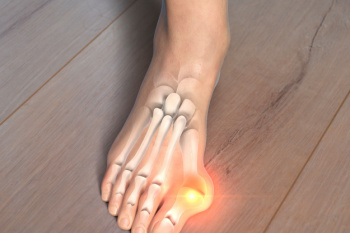
A bunion, medically termed hallux valgus, is a bony bump that forms at the base of the big toe. This condition develops when the big toe pushes against the adjacent toe, causing the joint to protrude outward. Bunions can result from various factors, including genetics, wearing tight or ill-fitting shoes, and foot injuries. Individuals with certain foot types, such as flat feet or low arches, are more prone to developing bunions. Additionally, occupations or activities that involve repetitive stress on the feet can increase the risk. Bunions are a relatively common foot ailment, affecting millions of people worldwide, with women being more susceptible than men as a result of wearing high heels or narrow shoes that can worsen the condition. While bunions may initially cause mild discomfort, they can progressively worsen, leading to pain, inflammation, and difficulty walking. A bunion can be uncomfortable, and a podiatrist can offer you effective relief strategies. If you have this condition, it is suggested that you consult this type of doctor who can offer appropriate treatment methods.
If you are suffering from bunion pain, contact Howard Kimmel, DPM of Buckeye Foot Care. Our doctor can provide the care you need to keep you pain-free and on your feet.
What Is a Bunion?
Bunions are painful bony bumps that usually develop on the inside of the foot at the joint of the big toe. As the deformity increases over time, it may become painful to walk and wear shoes. Women are more likely to exacerbate existing bunions since they often wear tight, narrow shoes that shift their toes together. Bunion pain can be relieved by wearing wider shoes with enough room for the toes.
Causes
- Genetics – some people inherit feet that are more prone to bunion development
- Inflammatory Conditions - rheumatoid arthritis and polio may cause bunion development
Symptoms
- Redness and inflammation
- Pain and tenderness
- Callus or corns on the bump
- Restricted motion in the big toe
In order to diagnose your bunion, your podiatrist may ask about your medical history, symptoms, and general health. Your doctor might also order an x-ray to take a closer look at your feet. Nonsurgical treatment options include orthotics, padding, icing, changes in footwear, and medication. If nonsurgical treatments don’t alleviate your bunion pain, surgery may be necessary.
If you have any questions, please feel free to contact one of our offices located in Brook Park and Willoughby, OH . We offer the newest diagnostic and treatment technologies for all your foot care needs.
